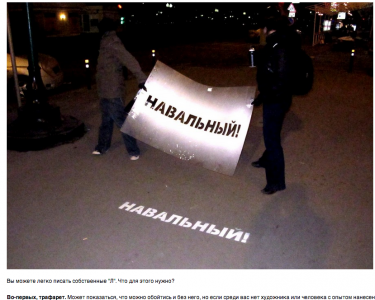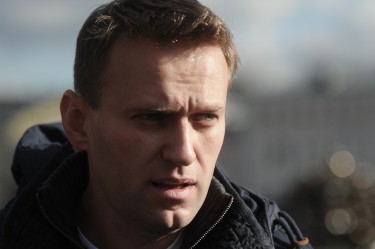Pussy Riot, eat your heart out. Later this week, on Wednesday, April 17, 2013, Russia’s most polarizing blogger, Alexey Navalny (often described as the opposition’s greatest hope for electoral breakthrough, should it ever happen), will stand trial for embezzling roughly half a million dollars from a state-owned timber company in the city of Kirov, home to about as many people as dollars Navalny allegedly stole. In a country constantly plagued by politicized legal proceedings, prosecuting the nation’s most prominent netizen promises fireworks.
Russia is a place that’s no stranger to courtroom outrage. Last August, Pussy Riot may have set a new standard for global scandal, but the trials against former oligarchs Mikhail Khodorkovsky and Platon Lebedev in 2004 and 2010, as well as the “judicial murder” of investment banker William Browder’s colleague Sergei Magnitsky in 2009, have all blackened Russia’s image at home and abroad for nearly decade now. This is to say nothing of the looming trials against the more than two dozen “Bolotnoe Delo” suspects (supposedly involved in instigating acts of violence against riot police at a mass rally last year on May 6). More than half of these people have been rotting for months in pretrial detention. Others were spared incarceration, but they too await their day in court. The muscly Maxim Luzianin has already been sentenced [ru] to over four years in prison.
Activists have created a website, 6may.org, to spread awareness about the still-ongoing investigation, regularly publishing sympathetic bulletins about individual suspects, and encouraging the public to donate money [ru] to their legal defense and publicity campaign. Navalny’s own “political prisoners” project, rosuznik.org, also collects crowdsourced funds for the Bolotnoe Delo accused, among others.
On what netizen support, other than his own RosPil offshoots, can Navalny rely, if he too finds himself behind bars, come the end of his trial in Kirov?
At the time that I write this, exactly five hundred Facebook users have pledged to attend a demonstration [ru] outside Novopushkinsky Square in Moscow, scheduled for the day that Navalny’s trial in Kirov begins. The rally—yet to be sanctioned by the city’s authorities—is being organized by “The Citizen Federation,” a movement tied [ru] to quasi-oppositionist oligarch Mikhail Prokhorov and human rights activists such as Lev Ponomarev.
The comments section on that Facebook event features your standard mix of earnest support and jaundiced Internet trolling. Sergei Valuev, for instance, writes:
Я не поддерживаю Навального, потому что ему не верю
I don’t support Navalny because I don’t believe him.
Ilya Barsukov declares:
Наваленный такой же вор как и правящая псевдо элита! Стране нужен настоящий лидер- оппозиционер, но я такого пока не вижу. И видимо не увижу, т. К. Путин в своем деле профессионал
Navalny is the same kind of thief as all the ruling pseudo elite! The country needs a real leader-oppositionist, but I don’t see anyone like that. And apparently I’m not going to see one, as it seems Putin is a professional [at keeping out competition].
The group’s creator Igor Bakirov, meanwhile, has tried to stay on message:
Друзья, реально нужно чтобы на митинг пришло много много людей, приглашайте своих друзей и друзей своих друзей
Friends, we really need for lots and lots of people to come to the rally. Invite your friends and your friends’ friends!
Elsewhere on Facebook, journalist Alexandra Astakhova has launched a group [ru] titled “The Case Against Navalny Is a Case Against Us All!” The group’s self-description begins with the following fighting words:
Эта группа объединяет тех, кто понимает: уголовные дела, сфабрикованные против Алексея Навального, направлены против всех нас. Шаг за шагом преступный режим, опьяненный безнаказанностью, делает жизнь в нашей стране невыносимой, шаг за шагом подбирается к нам, к нашим друзьям.
This group unites those who understand that the criminal cases fabricated against Alexey Navalny are directed at us all. Step by step, the criminal regime—intoxicated on impunity—makes life in our country more unbearable. Step by step, it closes in on us, on our friends.
Astakhova’s group (open to the public) now boasts over 1,660 members [ru], including many prominent members, both Russian and foreign, of the Moscow press corps (and more than a few activists), such as: The Guardian’s Miriam Elder, Ekho Moskvy’s Tikhon Dzyadko, activist Ilya Yashin, satirist Viktor Shenderovich, The New Times’ Ilya Barabanov, activist Olga Romanova, Slon.ru’s Tonia Samsonova, Berlingske’s Simon Kruse, The New Times’ Yevgenia Albats, EJ.ru’s Aleksandr Ryklin, and Ekho Moskvy’s Ksenia Larina—just to name a few.

Screen capture from Oleg Kalman's LiveJournal instructions for “becoming Navalny's secret agent,” 13 April 2013.
In a photo campaign that somewhat mirrors the anti-homophobia website loveislegal.ru (an association Navalny and company would probably wish to avoid), Navalny-supporters have begun publishing photographs [ru] of themselves holding up signs that read, “The case against Navalny is a case against me!” Oleg Kalman, Astakhova’s colleague at the newspaper Vedomosti, has similarly encouraged [ru] Russians to get involved by “becoming Navalny’s secret agents” and spray-painting Navalny’s surname onto the asphalt wherever possible. (Kalman insists this is legal, so long as people keep the paint on the ground, though he also advises readers to carry out the deed at night, when nobody is looking.) “It’s not vandalism, you’re not destroying someone else’s property, and the inscription will wear off after a couple of months,” he assures his audience.
Russia’s netizens—or at least Moscow’s most active denizens—seem to be ready for a fight. Will their protests pass with a whimper or unleash a new wave of social unrest? Are Russians ready to take up Navalny’s cause? Or does the nation suffer from a crippling “political prisoner” fatigue? The sanctity of Moscow’s pavement, along with the fates of several human beings, hangs in the balance.









8 comments
Good discussion of the case by somebody not-known to be a Russophobe, Mark Galeotti:
http://inmoscowsshadows.wordpress.com/2013/04/13/the-navalny-case-and-the-final-battle-between-good-and-neutrality/
Thanks, John. My comments on that blog post are actually what encouraged me to write this Global Voices piece, though I’ve taken a distinctly more netizen approach here.
As for Professor Galeotti’s status as a “russophobe,” I regret to inform you that very recently he did join the “authoritative” list of offenders at http://tchaykovsky.com/rusphobi/edward_3.htm
In all seriousness, though, his post raises a number of good points and questions. He and I clearly disagree about the nuts and bolts of Russians’ civil awareness, but that doesn’t diminish anything.